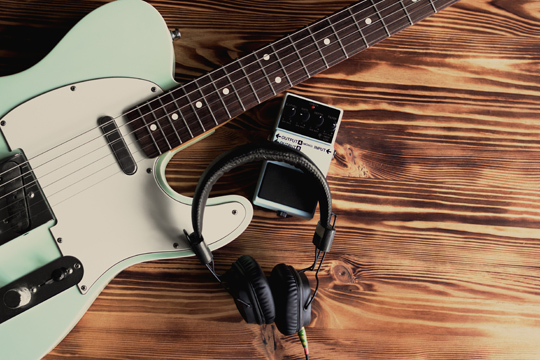Pop songs about the pandemic
Freiburg, Jan 08, 2021
“Damn, I don’t wanna get infected by the virus,” a voice belts out. Naturally, we are talking about the German pop song from the spring of 2020 about corona. Songs like this one got millions of clicks on the Internet from bands such as “Die Ärzte” oder “Frei.Wild” in 2020. Dr. Dr. Michael Fischer is Managing Director for the Center for Popular Culture and Music in Freiburg, working there as a cultural scholar. For the online magazine pop-zeitschrift.de, he investigated how German pop culture has dealt with the pandemic during the first lockdown in March and April 2020. Hans-Dieter Fronz sat down for a chat with him.
 Pop songs about the coronavirus were in demand: many songs about the pandemic were created in private home recording sessions in the spring of 2020. Photo: meteoritka /stock.adobe.com
Pop songs about the coronavirus were in demand: many songs about the pandemic were created in private home recording sessions in the spring of 2020. Photo: meteoritka /stock.adobe.com
Mr. Fischer, how does the German pop music scene take on a topic such as Corona?
Michael Fischer: There is a very broad spectrum of musical exploration, ranging from private home recording sessions to songs by professional musicians, including well-known bands such as “Die Ärzte” or also the South Tyrolean group “Frei.Wild.” The approach to the serious topic is not infrequently humorous, especially in the very first phase of the pandemic. For example, well-known pop songs were whimsically rewritten. “Verdammt, ich will mich / Ich will nicht / Mit Viren infizier'n” (“Damn it, I don't want to be infected with viruses”) is a parody of a song by Matthias Reim. But the tone quickly gives way to emotional consternation.
What are the songs about?
The goal of the songs is to overcome fear in a very broad sense. Pop songs attempt to culturally contain the threat of the virus and the fear associated with it by artistic means. However, there is hardly any talk of illness and dying in the songs. That would also be counterproductive, because pop music is sociologically and economically a part of entertainment culture. The listeners are not looking to amplify their fears in these songs, but rather to find ways of coping with their fears. In terms of content, one could speak of a reflection of the listeners' social situation. It is about what they and all of us experienced in the first wave, in the first lockdown: Insecurity, loneliness, boredom, no parties, no visits to friends and so on.
Have the songs actually achieved what they set out to do?
In order to answer this question, one would actually have to conduct empirical research, i.e., surveys. But I do think that the goal of overcoming fear is being achieved. At least, offers are being made in this direction. Namely, the sober reality of what you hear on the news is translated into emotions and fabrication. Listeners must be able to identify with these stories, for example by associating their own fears and experiences with them, thereby reducing anxiety. At the same time it creates a feeling of belonging to a group, perhaps even a sense of solidarity.
 Michael Fischer examined German pop songs: " There’s almost never any plain talk, but everything is emotional, a little fluffy." Photo: Klaus Polkowski
Michael Fischer examined German pop songs: " There’s almost never any plain talk, but everything is emotional, a little fluffy." Photo: Klaus Polkowski
Are things specified more or less clearly? Or does everything remain vague and fuzzy?
The way pop songs are created requires that everything remain a bit superficial. I specifically examined the area of German pop: it is a lot about one’s own identity anyway and the self-reflection of the ego. There’s almost never any plain talk, but everything is emotional, a little fluffy. Exactly these characteristics that we find in German pop in general can be found in these so-called Corona songs. Now, they don’t have to fulfill some kind of ethical programs, but it can be said that the one-sided feel-good program is a weak point of this music genre. The ten most successful German-language Corona songs that I have examined do not take the perspective of those who are ill. It’s always about healthy people who are bored, who can’t party or go to a concert. Existential issues are hardly ever addressed.
Is there actually any criticism - of political measures, for example?
Not really. The German-language Corona songs are largely apolitical, with one prominent exception: the band “FreiWild,” which is located in the right-wing spectrum, deals with the pandemic ironically or downright cynically in the song “Weltuntergang” by ridiculing the concern about the disease. Incidentally, the band members were then infected with the virus themselves. Afterwards they put on a second version of the song, which takes a different direction in terms of content and departs from being ironic about the pandemic in the first version. However, when evaluating the content of a song, one must always take a close look at the phase of the infection's occurrence during which it was written. Even if many songs often slide into sniveling and sentimentality: Positive values are also invoked, such as striving for more cohesion, more humanity, more patience. But even these wishes remain unspecific. The songs don't demand anything, but wallow in feelings. That is, of course, perfectly legitimate and perhaps hits the mark.
How have the corona songs developed since last spring?
I didn't follow up on that. One could look at whether the second wave was similarly productive and whether the tone has become more serious. It would also be interesting to compare it with international or English-language pop music. My investigation was guided primarily by the question: Do the scientific findings about German pop also apply to the Corona songs of the first wave of the pandemic? And there I would simply say: yes.
Center for Popular Culture and Music
Article in pop-zeitschrift.de (in German)

